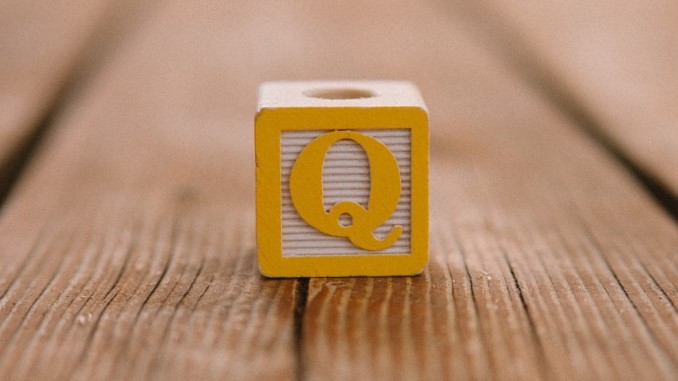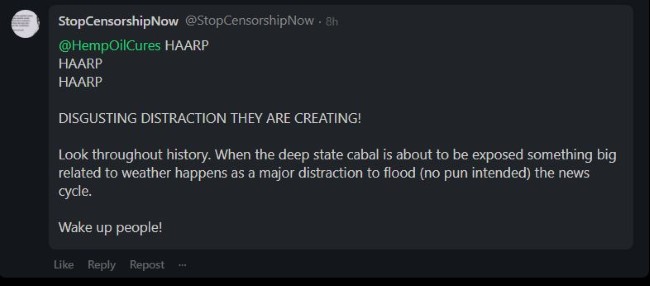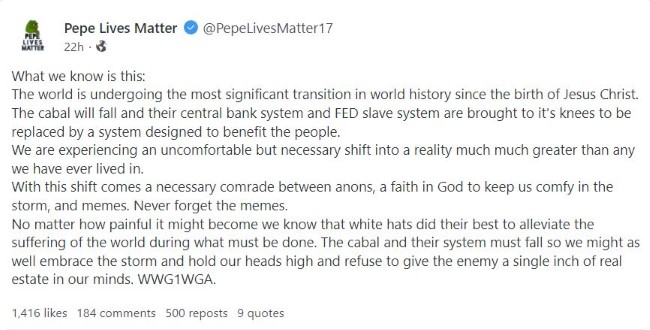QAnon Is Dead. What Replaced It Is Worse
Photo via Unsplash, Wesley Tingey
If you, against your better judgment, decided to go prowling around the darkest corners of the internet to try and understand what the most conspiracy-minded weirdos are up to these days, there’s one term you might expect to see but probably won’t: QAnon.
It’s amazing, in retrospect, how quickly the way we view the online far right can and must evolve. Those of us like myself who keep an eye on these spaces don’t really have a choice in the matter; if you want to attempt to stay in touch with an inane, writhing mass of ever-evolving conspiracy theorist beliefs and ultra conservative dogma, you need to recognize the fundamental shifts in what these people believe and how they’re applying their beliefs.
- NBC Seems to Suggest a Children's Video Game is to Blame for UnitedHealthcare CEO's Killing
- Possible United HealthCare CEO Killer Caught, Had Manifesto Criticizing Profits Over Care
- Nancy Mace Is an Irredeemable Garbage Person Who Loves Bullying Vulnerable People and Yet the Media Still Believes Her
Not that I would blame you for wanting to stay as far away from this kind of weaponized hate as possible, for the sake of your own mental health, but with the election looming in November it’s something I don’t feel I have the luxury to ignore. Or in the simplest terms: When the next Jan. 6 happens, I would prefer to have an idea of what kinds of insane beliefs are driving it.
So I lurk, and watch what people are saying in some of the worst corners of the internet, in the hopes of understanding what is driving them.
In 2024, “QAnon” as a relevant online concept is largely dead, and in truth it’s been dead since probably late 2022. The conspiracy theorists who called themselves Anons? They’re still there, but they’ve now been nudged and coerced in new directions, absorbed by other groups that are considerably more dangerous and mobilized than the vague idea of QAnon ever was. The online far right has grown less colorfully zany, and more banal in its casual embrace of racism and violence.
So, let’s take a step back to explain, as much as anyone possibly can, where QAnon sprang from, why it dissolved and where those people have now gone.
How QAnon Began, Flourished and Withered
The central tenet of the QAnon conspiracy theory was the belief that the world is secretly run by a Satanic cabal/Deep State of left-wing cannibalistic pedophiles and child traffickers, and has been for hundreds or thousands of years. This “cabal” surrounds normal, virtuous citizens on all sides and is presumed to control every aspect of politics, global infrastructure, international governments, higher education, popular culture and entertainment, mass media and even worldwide charities and nonprofits. As is pretty much always the case with cults that believe in an invisible enemy, the cabal is somehow both all-powerful and all-knowing, but also something that can be defeated by the good guys or “white hats” if you simply watch enough YouTube videos and buy enough merch. These kinds of direct contradictions crop up constantly, bolted on to a particular strain of evangelical Christian mysticism that essentially falls back on “if God is for us, who can be against us?”
Information about the evil cabal or Deep State was delivered via communications–anons love to call any message “comms,” because they fetishize militaristic language, among other things–from “Q,” a mysterious online presence purported to be a high-ranking U.S. government official with access to secret, classified information. Originally starting on fringe imageboards 4chan and 8chan, Q passed along this information via extremely vague, prophetic sounding “Q Drops,” which were then interpreted by online influencers who quickly built up their own cults of personality as what were essentially the high priests of this particular cult. The objects of worship are twofold: Q himself, and Donald J. Trump.
 I do miss when the extent of Anon craziness was claiming that the Deep State was creating hurricanes to distract from other things in the news cycle.
I do miss when the extent of Anon craziness was claiming that the Deep State was creating hurricanes to distract from other things in the news cycle.
QAnon flourished during the Trump years, particularly because the Trump administration offered enough plausible deniability for believers to claim he was waging a secret war against “the cabal” on their behalf while in office. Every news headline was assumed to have secret importance—a story like that container ship blocking the Suez Canal in 2021 took on mythic status among Anons as a “secret operation” thwarting the Deep State. Any time Trump did something that directly contradicted or undermined these beliefs, the Q influencers were always there to desperately rationalize how this was all “part of the plan,” and people just needed to have faith. It didn’t matter that the likes of Q constantly promised events that never came to pass, such as the arrest and execution of people like Hillary Clinton or Bill Gates. The only immutable belief was their certainty of victory in the end.
Joe Biden’s victory in the 2020 election led to fracturing of the already disjointed group, as various Q influencers veered off in different directions. Some claimed that the “fake election” was just another part of the Trump master plan, while others cast Trump as the aggrieved party with an election stolen away from him by the omnipotent power of the Deep State.
Is he a master tactician, or a victimized martyr? He can’t be both.
The Jan. 6 Capitol riot helped further tear the Anon community apart, due to the lack of a cohesive central narrative they could all immediately glom onto, exacerbated by the fact that Q’s own posting went silent during this humiliating period. Anons and Q influencers were left having no idea how to feel about the most crucial issues facing them.
Were the people who stormed the Capitol that day patriots who are to be praised and feted, or “antifa plants” meant to make Trump’s supporters look bad? Did Trump slink out of Washington D.C. with his tail between his legs, or make a tactical retreat while secretly retaining the full powers of the presidency? If Trump is still the secret president, then is he to blame for the Biden administration’s policies? Is Biden omnipotent, or doddering? The weight of the contradictions became too much for even many Anons to bear.
 The influencers were always there, assuring the believers to “trust the plan.”
The influencers were always there, assuring the believers to “trust the plan.”
The result of this crushing array of disappointments and concrete deadlines coming and going was increasing disenchantment among the Anon community, and they began to drift away from the influencers and Q drops that they once took as gospel. Q himself, writhing in embarrassment, disappeared and went silent at this stage, seemingly unable to rationalize the failed predictions and assurances any further. Around the same time, many journalists researching QAnon’s origins became increasingly convinced that Q’s most likely identity had been the owners and operators of the message board all along, Jim and Ron Watkins. With that suspicion floating around, Q faded into the background.
The Q account attempted a comeback in June and November of 2022, only to be met with an apathetic shrug from its former adherents. Devotees noted that the language and cadence of the posts seemed to have changed, while Q influencers, fresh off 18 months of narrative shaping of their own, led the charge in branding the new Q drops as suspicious.
The new Q drops of Nov. 2022 in particular had a clear goal of convincing Americans to vote in the midterm elections of that year, which was an extremely difficult sell. How could it not be, when those in the Q influencer and grifter movement had spent the last two years convincing their audience that all American elections are corrupt, fake “theater” designed to keep them subdued and placid while the Deep State power brokers wield true power behind the scenes?
As it turns out, when you convince enough people that their vote doesn’t count, it’s very difficult to then persuade them to go vote when election time comes around.
In this way, Q’s attempted return in 2022 ended up being foiled by the very conspiracy theorist mindset that he helped to amplify and establish. Recognizing that it wasn’t going to work this time, the account went silent again and has not posted since.
Where Did the Anons Go?
If this story had a happy ending, it would involve those who saw themselves as “Anons” crawling out from the underside of a digital log, blinking at the surprisingly bright sunlight, and considering the possibility that everyone they looked to for guidance had been lying to them for the last 8 years. Families would be reknit; therapy would probably be attended. Some lives would be repaired as people realized they’d been exploited by political demagogues or grifters. No small amount of embarrassment would be had.
This is not what happened. The Anons fleeing from the world of Q were looking for safe harbor where they could continue receiving the same potent daily infusions of fear and anger they had been nurtured by, and the white/Christian nationalist web community pounced on the opportunity to scoop up a huge influx of ready-made converts.
There had always been racists and bigots of various kinds in the world of Anons. But oddly, outright racism or xenophobia was rarely at the heart of Q’s specific agenda. Q’s message had been more of a sensationalized, fantastical libertarian and economic one, where the government, Deep State and “global elites” were the prime boogeymen rather than those of specifically different ethnicities or skin tones. Q and the Anons who followed him would often act as if their movement had no racial basis at all, and was instead in defiance of the made-up global cabal of radical leftists. I even wrote as much in 2021 in observing the Anon community:
The funny thing about QAnon is that the racists are sort of there as a side effect rather than a primary goal. The smarter Q influencers realize that they can cast a wider net and attract more malleable minds if they claim that Trump and Q are looking to improve the world for people of all races, faiths and creeds.
As a result, the Anon community would often hold surprisingly scattered, diversely strange beliefs rather than marching in lockstep with traditional ultra conservative viewpoints, and they would often hesitate to embrace white nationalist or outright racist talking points. Most Anons, for instance, would have characterized their enemies as being like Hitler, rather than, you know, admiring Hitler themselves.
But as these former Anons were scooped up or fell into the camps of far-right, ultra-racist grifter influencers—think the likes of Nick Fuentes or Charlie Kirk—the tone of the sites they were operating on, such as Gab, Parler and Truth Social began to noticeably change. People who would formerly have been shouted down for using racial or ethnic slurs steadily appeared more emboldened. There was less of a wink-wink, nudge-nudge aversion to openly stating racist opinions, or wishing violence on entire groups.
Broad references to the nefarious plans of “the Jews” or “the blacks” became more common in my observations. No longer were these kooks talking about weather machines, or fluoride in the drinking water, or aliens impersonating public officials. Now they were talking about buying rifles and practicing for the upcoming societal collapse they see as a welcome chance to put their new bloodlust into action. There was no longer any need for these former Anons to act as if their movement was free from racial bias, because now they had become welcome in a community that was proudly affirming its own racism on a daily basis.
This is a far more dangerous predicament for the rest of us to be in. Events like the 2016 Comet Ping Pong Pizzagate shooter now have the potential to be much more common. The former Anon next door who used to spend his time scanning the sky for chemtrails or clutching healing crystals may now be spending it making bomb threats to a local library for hosting a drag story time, or emptying hundreds of AR-15 rounds at the rifle range, fantasizing about the day when he’ll be morally justified in turning that weapon against imagined “looters” in the coming dystopian collapse.
The significance of these people preparing to take more concrete and violent action should not be overlooked. At its core, QAnon was not a movement built around actually translating many of its beliefs into action, beyond the “action” of getting those people to open their wallets to con men. The key Q belief was that the “white hats” led by Trump were secretly in control, that the glorious coming Storm was always perpetually on the horizon, when everything in American society would be fixed by the punishment of the bad guys. The average Anon believer never had to genuinely think they would be taking much of an active role in all this—they were just supposed to “educate themselves” through their online “research” and prepare for the coming revolutions that unnamed white hats would lead.
The far-right militia types that these Anons have now fallen in with, however? These guys aren’t content with just wielding ideological power over a collection of suburban dads and uncles.
The Proud Boys of the world want to put those weekend warriors to work against American minorities and their other chosen scapegoats. There was no shortage of Anons in attendance on January 6th, but by and large these people were the ones in goofy costumes, gym shoes and American flag paraphernalia stealing souvenirs from the floors of Congress, rather than the more organized members storming the building with riot gear, combat boots, masks and zip ties, looking for specific targets.
Back in 2021, we were fortunate that the flood of Anons hadn’t yet been genuinely militarized and mobilized, or else who knows how much more effectively they might have achieved their goals that day. Going on four years later, their beliefs are based on fewer imagined absurdities, and more abject hatred. This implies a much more capable, organized movement than the one that previously believed that Donald Trump would be their savior.
If there’s any silver lining here, it’s that radicalizing people to this extreme degree does tend to bite you in the ass in its own way, when the ingrained, nonsensical beliefs become too strong for right-wing politicians to control. Case in point: You would think that the average former Anon’s slavish devotion to Donald Trump himself might be stronger than ever at this point, but a genuinely significant portion of the former Anon community has actually come to despise Trump in the last few years, seeing him as a traitor to his race who isn’t virulently conservative or racist enough to meet their new standard. They basically learned their conspiracy theory talking points too well.

A typical anti-Trump meme that former Anons now share, blaming Trump for the vaccine, imprisoned Jan. 6 rioters, and even implying that he’s TOO SUPPORTIVE of LGBTQ rights, if you can wrap your head around that.
If you warp a former Anon’s worldview enough, even the most sensible political positions lack the kind of voter-alienating extremism they now demand. Trump, for instance, still seeks credit for the development of the COVID-19 vaccine, and because they were radicalized against those vaccines, many former Anons believe that Trump is complicit in some sort of medical genocide against Americans. Likewise, they look at Trump’s ongoing support of Israel and condemn him for it—not because they empathize with Gazans—but because they were so successfully infused with antisemitism that they want Trump to have no association with Jews of any kind and can’t understand his most basic attempts to court Jewish voters as a demographic.
In the same way, many former Anons condemn Trump’s attempt to strike any kind of middle ground on abortion, even simply saying that he wouldn’t universally ban it, because they insist that makes him an abortion supporter. It’s one of the grand ironies of our modern political age: These people were probably in the top 1% of Trump supporters in terms of their slavish devotion to him, but they’ve never actually understood that Trump has more or less no ideology of his own, and simply says whatever he thinks will benefit him most at any given time.
Are these desertions likely to actually impact election results in 2024? It’s impossible to say, with a uniquely unpredictable and illogical internet niche, but it’s fascinating to watch what an entire group believes get turned on its head. So too is it impossible to predict how the former Anons might react to a Trump loss or victory in November, but thanks to the new crowd they’ve found themselves joining, I’m distinctly afraid to find out.
Suffice to say, they’re no longer just waiting on their computers for the likes of Donald Trump to come along and save them. Now they intend to do it themselves, with all the delusion and potential violence that could entail.